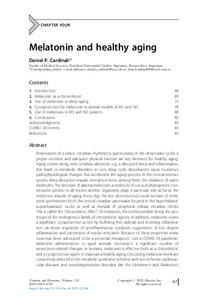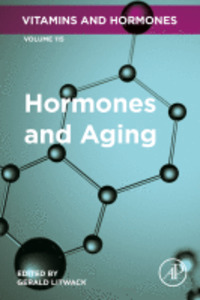Por favor, use este identificador para citar o enlazar este ítem:
https://repositorio.uca.edu.ar/handle/123456789/16499| Título: | Melatonin and healthy aging | Autor: | Cardinali, Daniel Pedro | Palabras clave: | MELATONINA; ENVEJECIMIENTO; SALUD | Fecha de publicación: | 2021 | Editorial: | Elsevier | Cita: | Cardinali, D.P. Melatonin and healthy aging [en línea]. En: Litwack, G. (eds.). Vitamins and Hormones. Elsevier, 2021 doi:10.1016/bs.vh.2020.12.004 | Resumen: | Abstract: Preservation of a robust circadian rhythmicity (particulsarly of the sleep/wake cycle), a proper nutrition and adequate physical exercise are key elements for healthy aging. Aging comes along with circadian alteration, e.g. a disrupted sleep and inflammation, that leads to metabolic disorders. In turn, sleep cycle disturbances cause numerous pathophysiological changes that accelerates the aging process. In the central nervous system, sleep disruption impairs several functions, among them, the clearance of waste molecules. The decrease of plasma melatonin, a molecule of unusual phylogenetic conservation present in all known aerobic organisms, plays a particular role as far as the endocrine sequels of aging. Every day, the late afternoon/nocturnal increase of melatonin synchronizes both the central circadian pacemaker located in the hypothalamic suprachiasmatic nuclei as well as myriads of peripheral cellular circadian clocks. This is called the “chronobiotic effect” of melatonin, the methoxyindole being the prototype of the endogenous family of chronobiotic agents. In addition, melatonin exerts a significant cytoprotective action by buffering free radicals and reversing inflammation via down regulation of proinflammatory cytokines, suppression of low degree inflammation and prevention of insulin resistance. Because of these properties melatonin has been advocated to be a potential therapeutic tool in COVID 19 pandemic. Melatonin administration to aged animals counteracts a significant number of senescence-related changes. In humans, melatonin is effective both as a chronobiotic and a cytoprotective agent to maintain a healthy aging. Circulating melatonin levels are consistently reduced in the metabolic syndrome, ischemic and non-ischemic cardiovascular diseases and neurodegenerative disorders like the Alzheimer's and Parkinson's diseases. The potential therapeutic value of melatonin has been suggested by a limited number of clinical trials generally employing melatonin in the 2–10 mg/day range. However, from animal studies the cytoprotective effects of melatonin need higher doses to become apparent (i.e. in the 100 mg/day range). Hence, controlled studies employing melatonin doses in this range are urgently needed. | URI: | https://repositorio.uca.edu.ar/handle/123456789/16499 | ISBN: | 978-0-323-85548-8 | ISSN: | 0083-6729 | Disciplina: | MEDICINA | DOI: | 10.1016/bs.vh.2020.12.004 | Derechos: | Acceso abierto. 24 meses de embargo | Fuente: | Litwack, G. (eds.). Vitamins and Hormones. Elsevier, 2021 |
| Aparece en las colecciones: | Libros o partes de libro |
Ficheros en este ítem:
| Fichero | Descripción | Tamaño | Formato | |
|---|---|---|---|---|
| melatonin-healthy-aging.pdf | 389,34 kB | Adobe PDF |  Visualizar/Abrir | |
| cover.gif | 15,52 kB | GIF |  Visualizar/Abrir |
Visualizaciones de página(s)
55
comprobado en 27-abr-2024
Descarga(s)
38
comprobado en 27-abr-2024
Google ScholarTM
Ver en Google Scholar
Altmetric
Altmetric
Este ítem está sujeto a una Licencia Creative Commons

